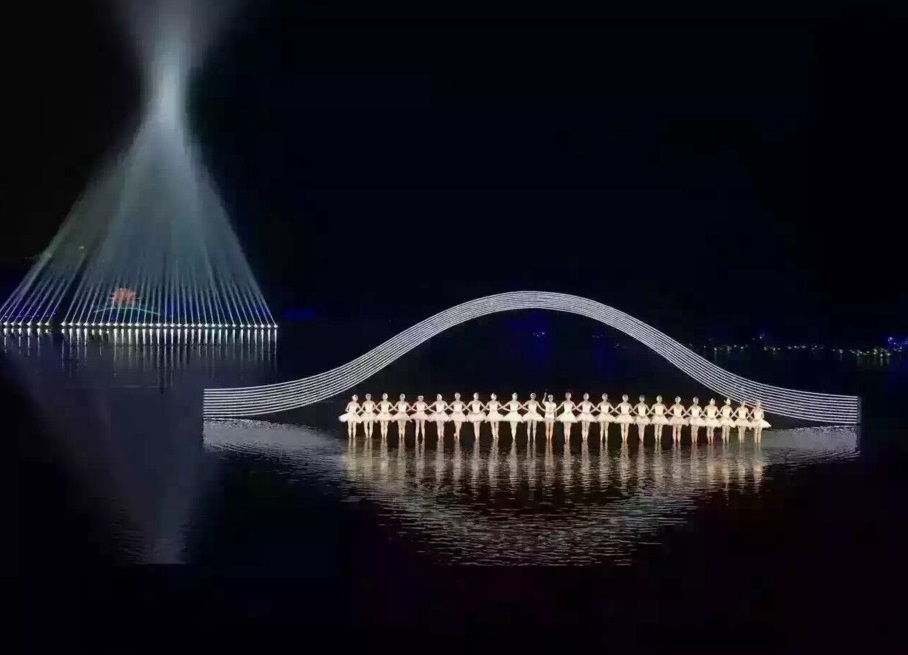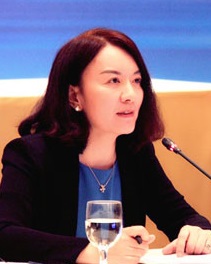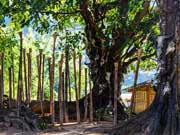


Artists dance during an evening gala for the G20 summit at the West Lake scenic zone in Hangzhou, capital of east China's Zhejiang Province, Sept. 4, 2016.
The ancient city Hangzhou has abundant cultural heritage to offer as its name card: The Three pools Mirroring the Moon, the Spring dawning the Su Causeway, and the great canal winding its way north, etc. The charm of the lower reach of Yangtze River in China is marked as “Chinese imprint”.
Besides the imprint of beautiful sceneries, there is another imprint, abstract but even more enchanting. As the Group 20 (G20) Summit gathers world leaders in Hangzhou, and the Business 20 (B20) Summit offers platform for ideas to clash in the same city. By the Qiantang River and the West Lake, what kind of “Chinese imprint” will Hangzhou make?
“Build an open global economy”, “promote inclusive development”… In the opening remarks at the G20 Summit in Hangzhou, Chinese President Xi Jinping has written out prescription for the global economy. A day before, in the keynote speech at the opening ceremony of the B20 Summit, President Xi said, “It is meant to build not China’s own backyard garden, but a garden shared by all countries.” China is not the challenger to the current international institution, but a contributor to it. There are stories to best footnote Xi’s speeches, decoding an answer the world has been looking forward to.
The first story is a story about silk. Hangzhou has been hailed as “the Homestead of Silk” since ancient time. From thousands of years ago, the silk from Hangzhou has travelled the desert and the sea to be sold in all across the world.
The story is blessed with a new note in modern times. President Xi has launched the Belt and Road Initiative, linking the two biggest economic and cultural veins in the world and playing a modern symphony of connectivity. The Initiatives have been acknowledged by all countries to whom it has extended its way. It is a road of trade, a road where civilizations meet, and a road that leads to peace and friendship. The Belt and Road Initiative is to inject “positive energy” into the world today, and is marked as the new “Chinese imprint”.
The second story is a story of “green mountains and clear water”. “Green mountains and clear water are as good as mountains of gold and silver,” President Xi made this dialectic notion in his speech while he held office in Zhejiang. Under the guidance of this philosophy, the once polluted mountain and water regained its bright pigments. Hangzhou, hailed as “Paradise on Earth”, has once again taken pride in its beautiful sceneries.
Such philosophy can be applied to a worldwide context. It is estimated that it will take five times the resources of the Earth to afford 1.3 billion Chinese to live “American lifestyle”. President Xi has made the promise that in the next five years, China will see a 23 percent decrease in water usage per GDP unit, a 15 percent decrease in energy consumption, and a 18 percent in carbon dioxide emission. Blue sky, green mountains, and clear water are another “Chinese imprint” to look forward to.
The protagonist of the third story is “Alibaba”. “Just one click of the mouse in Hangzhou, and you will be connected to the whole world,” said President Xi in his keynote speech. The e-commerce has reached a record 91.2 billion yuan ($14.3 billion) on a single day’s sale boost last year. Alibaba, the company who achieved this feat was established merely in 1999 and listed in the United States in 2014. With deep root in China’s ancient wisdom together with the gigantic market needs in China, the “Dream-maker” Alibaba is the embodiment of the thousands of Chinese enterprises that constitute the modern “Chinese imprint”.
The chart of ancient Silk Road has been extended to today, the green mountains and blue water is writing the history for generations to come, and the lively e-commerce companies are echoing the era of information… The three Hangzhou stories are the footnotes of today’s China. For the past 30 years, China has embraced the world with an open mind. The appeals made by President Xi come from the profound lessons learned in China’s own stories.
China’s “Moonlit night on Spring River” echoed Debussy’s “Moonlight”, and China’s zither melody “Mountain Stream” dances with the prestigious ballet “Swan Lake”. On the night of September 4, the G20 opening gala performance on the West Lake in Hangzhou has allowed a dialogue between “Chinese imprint” and culture from other parts of the world. Looking out to the future, the world economy will set sail again from this new starting point in Hangzhou towards a bigger ocean.

The author Lu Xinning is the Deputy Editor-in-Chief of People's Daily.
Day|Week

 Who Will Fit The Chinese Roles In Game Of Thrones?
Who Will Fit The Chinese Roles In Game Of Thrones? China's Hubei Shennongjia added to World Heritage List
China's Hubei Shennongjia added to World Heritage List Cute Dog At Fruit Stand Becomes Latest Internet Sensation
Cute Dog At Fruit Stand Becomes Latest Internet Sensation Top 10 livable Chinese cities
Top 10 livable Chinese cities The last primitive tribe in China
The last primitive tribe in China China's first intelligent security robot debuts in Chongqing
China's first intelligent security robot debuts in Chongqing A Total of 3,552 Subscribers Vanish In Two Days; YouTube Closes All Doors to Users’ Inquiries
A Total of 3,552 Subscribers Vanish In Two Days; YouTube Closes All Doors to Users’ Inquiries Out of this world! Futuristic UFO-shaped yacht has its own garden and a stunning underwater viewing deck
Out of this world! Futuristic UFO-shaped yacht has its own garden and a stunning underwater viewing deck An old tea house in Chengdu
An old tea house in Chengdu Furious Customer Crushes All the Buns from Vendor Just Because He Was Given the Wrong Flavor
Furious Customer Crushes All the Buns from Vendor Just Because He Was Given the Wrong Flavor